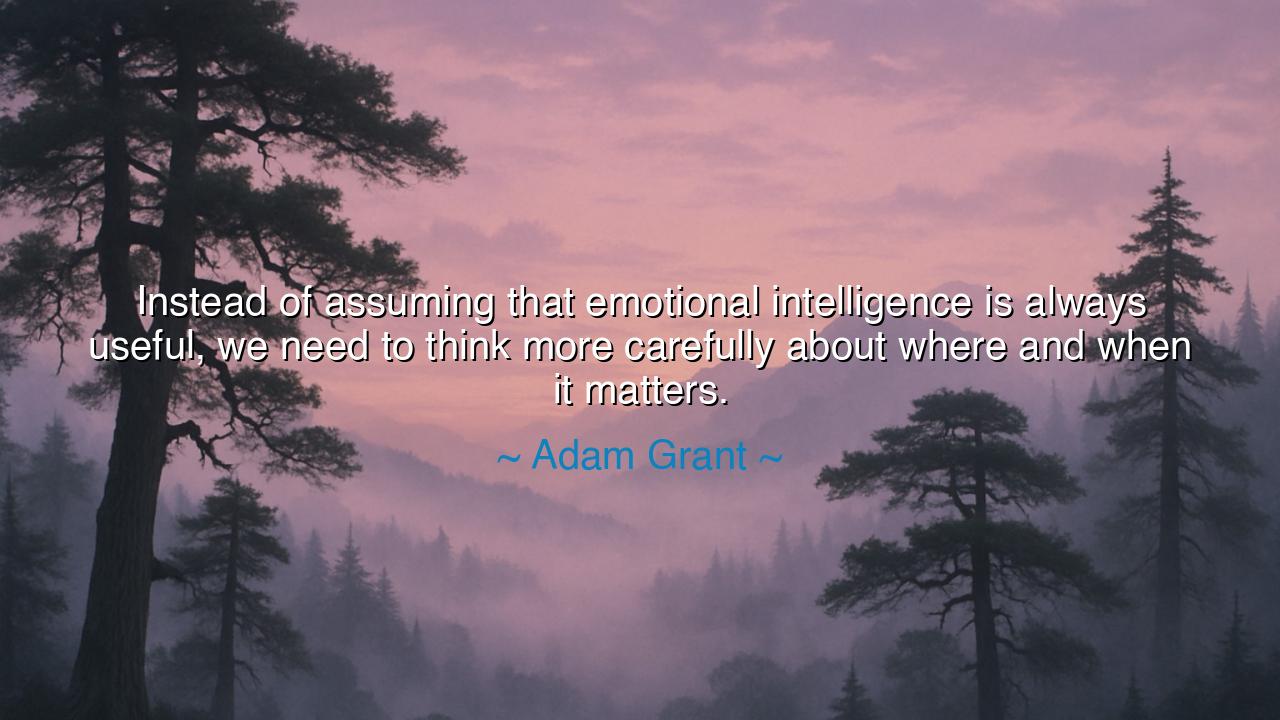
Instead of assuming that emotional intelligence is always useful
Instead of assuming that emotional intelligence is always useful, we need to think more carefully about where and when it matters.






When Adam Grant said, “Instead of assuming that emotional intelligence is always useful, we need to think more carefully about where and when it matters,” he was not casting doubt on the power of empathy, understanding, and self-awareness. Rather, he was summoning us to wisdom — to discernment in an age that prizes sentiment without measure. His words strike like a tempered blade: they remind us that every strength, when misapplied, can become a weakness; every virtue, when overused, can lose its virtue. For even light, if too intense, blinds the eyes.
In our modern age, the term emotional intelligence has been praised as the key to success and harmony — the art of understanding others, of mastering one’s feelings, of moving through life with tact and compassion. Yet Grant, a scholar of the mind and soul in the realm of work and leadership, reminds us that no skill is sacred in all places, nor useful in all times. Wisdom lies not in constant gentleness, but in knowing when gentleness must yield to truth; not in perpetual empathy, but in knowing when empathy must stand aside for justice. To be emotionally intelligent without moral clarity is to be a skilled navigator with no destination.
This teaching has ancient roots. The philosopher Aristotle once said that virtue is a balance between extremes — courage between recklessness and cowardice, generosity between wastefulness and greed. The same holds true for emotional intelligence. To feel deeply is noble, but to feel without discernment is perilous. A tyrant can use empathy to manipulate his followers. A cunning rival can use emotional skill to conceal deceit. Even in love and friendship, excessive sensitivity can paralyze decision. Thus, as Grant teaches, we must not only cultivate empathy, but also judgment — the power to know when, where, and to what degree emotion should guide us.
History offers many lessons in this balance. Consider Marcus Aurelius, the philosopher-emperor of Rome. He was a man of immense compassion, known for his patience and restraint. Yet when faced with rebellion, he did not let pity for his enemies blind him to his duty. He acted with firmness, guided by principle, not passion. His emotional intelligence was not softness but strength tempered by understanding. He exemplified the wisdom Grant describes: emotion, rightly governed by reason, becomes a tool for greatness; emotion left ungoverned becomes the architect of downfall.
In the realm of the modern world, too, we see this truth. The leader who seeks always to please, who cannot bear to offend, will lose the courage to lead. The teacher who shields every student from discomfort will rob them of resilience. The parent who confuses empathy with indulgence may raise not compassion, but entitlement. Thus, emotional intelligence, when worshipped as an absolute good, can betray its purpose. It must serve truth and action, not replace them.
Grant’s insight invites us to a higher understanding of ourselves. True intelligence, whether emotional or rational, is never blind. It listens, it weighs, it adapts. It knows that kindness can heal, but also that boundaries protect. It knows that tears can cleanse, but also that firmness can build. The wise do not reject emotion, nor do they kneel before it — they master it, using it as a servant of reason and moral clarity.
So let this teaching be remembered: emotions are sacred messengers, not sovereign rulers. Feel deeply, but think deeply also. When you act with empathy, ask whether your empathy serves truth. When you speak with compassion, ask whether your compassion strengthens or weakens the soul before you. As Adam Grant counsels, do not assume virtue without reflection. For only the discerning heart — the heart that knows when and where emotion truly matters — can walk the narrow path between kindness and folly, between gentleness and wisdom, and thus live as both human and wise.






AAdministratorAdministrator
Welcome, honored guests. Please leave a comment, we will respond soon